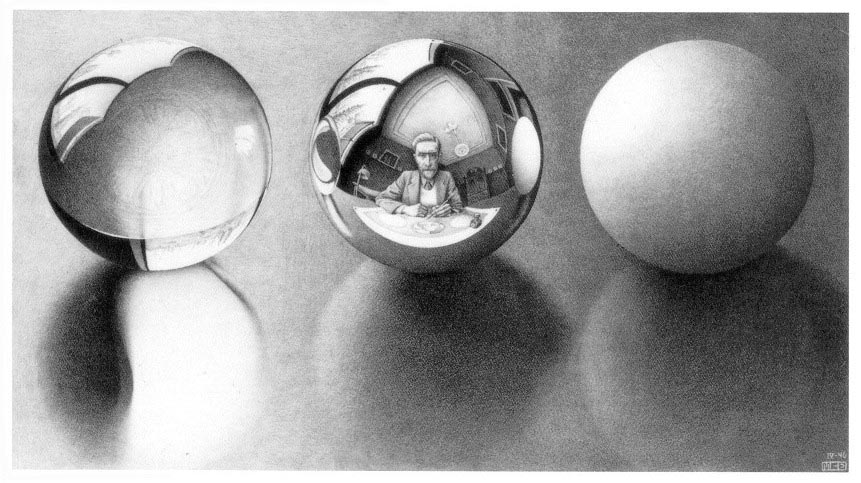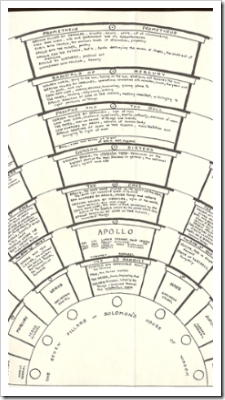
I am not the first to suggest it, but I will add my voice to those that want to claim that Giulio Camillo built the precursor of the modern personal computer in the 16th century. Claiming that anyone invented anything is always a precarious venture, and it can be instructive to question the motives of such attempts. For instance, trying to determine whether Newton or Leibniz invented calculus is a simple question of who most deserves credit for this remarkable achievement.
Sometimes the question of firsts is intended to reveal something that we did not know before, such as Harold Bloom’s suggestion that Shakespeare invented the idea of personality as we know it. In making the claim, Bloom at the same time makes us aware of the possibility that personality is not in fact something innate, but something created. Edmund Husserl turns this notion on its head a bit with his reference in his writings to the Thales of Geometry. Geometry, unlike the notion of personality, cannot be so easily reduced to an invention, since it is eidetic in nature. It is always true, whether anyone understands geometry or not. And so there is a certain irony in holding Thales to be the originator of Geometry since Geometry is a science that was not and could not have been invented as such. Similarly, each of us, when we discover the truths of geometry for ourselves, becomes in a way a new Thales of Geometry, having made the same observations and realizations for which Thales receives credit.
Sometimes the recognition of firstness is a way of initiating people into a secret society. Such, it struck me, was the case when I read as a teenager from Stephen J. Gould that Darwin was not the first person to discover the evolutionary process, but that it was in fact another naturalist named Alfred Russel Wallace, and suddenly a centuries long conspiracy to steal credit from the truly deserving Wallace was revealed to me — or so it had seemed at the time.
Origins play a strange role in etymological considerations, and when we read Aristotle’s etymological ruminations, there is certainly a sense that the first meaning of a word will somehow provide the key to understanding the concepts signified by the word. There is a similar intuition at work in the discusions of ‘natural man’ to be found in the political writings of Hobbes, Locke and Rousseau. For each, the character of the natural man determines the nature of the state, and consequently how we are to understand it best. For Hobbes, famously, the life of this kind of man is rather unpleasant. For Locke, the natural man is typified by his rationality. For Rousseau, by his freedom. In each case, the character of the ‘natural man’ serves as a sort of gravitational center for understanding man and his works at any time. I have often wondered whether the discussions of the state of the natural man were intended as a scientific deduction or rather merely as a metaphor for each of these great political philosophers. I lean toward the latter opinion, in which case another way to understand firsts is not as an attempt to achieve historical accuracy, but rather an attempt to find the proper metaphor for something modern.
So who invented the computer? Was it Charles Babbage with his Difference Engine in the 19th century, or Alan Turing in the 20th with his template for the Universal Machine? Or was it Ada Lovelace, as some have suggested, the daughter of Lord Byron and collaborator with Charles Babbage who possibly did all the work while Babbage receives all the credit?
My question is a simpler one: who invented the personal computer, Steve Jobs or Giulio Camillo. I award the laurel to the Camillo, who was known in his own time as the Divine Camillo because of the remarkable nature of his invention. And in doing so, of course, I merely am attempting to define what the personal computer really is — the gravitational center that is the role of the personal computer in our lives.
Giulio Camillo spent long years working on his Memory Theater, a miniaturized Vitruvian theater still big enough to walk into, basically a box, that would provide the person who stood before it the gift most prized by Renaissance thinkers: the eloquence of Cicero. The theater itself was arranged with images and figures from greek and roman mythology. Throughout it were Christian references intermixed with Hermetic and Kabalistic symbols. In small boxes beneath various statues inside the theater fragments and adaptations of Cicero’s writings could be pulled out and examined. Through the proper physical arrangment of the fantastic, the mythological, the philosophical and the occult, Camillo sought to provide a way for anyone who stepped before his theater be able to discourse on any subject no less fluently and eloquently than Cicero himself.
Eloquence in the 16th century was understood as not only the ability of the lawyer or statesman to speak persuasively, but also the ability to evoke beautiful and accurate metaphors, the knack for delighting an audience, the ability to instruct, and mastery of diverse subjects that could be brought forth from the memory in order to enlighten one’s listeners. Already in Camillo’s time, mass production of books was coming into its own and creating a transformation of culture. Along with it, the ancient arts of memory and of eloquence (by way of analogy we might call it literacy, today), whose paragon was recognized to be Cicero, was in its decline. Thus Camillo came along at the end of this long tradition of eloquence to invent a box that would capture all that was best of the old world that was quickly disappearing. He created, in effect, an artificial memory that anyone could use, simply by stepping before it, to invigorate himself with the accumulated eloquence of all previous generations.
And this is how I think of the personal computer. It is a box, occult in nature, that provides us with an artificial memory to make us better than we are, better than nature made us. Nature distributes her gifts randomly, while the personal computer corrects that inherent injustice. The only limitation to the personal computer, as I see it, is that it can only be a repository for all the knowledge humanity has already acquired. It cannot generate anything new, as such. It is a library and not a university.
Which is where the internet comes in. The personal computer, once it is attached to the world wide web, becomes invigorated by the chaos and serendipity that is the internet. Not only do we have the dangerous chaos of viruses and trojan horses, but also the positive chaos of online discussions, the putting on of masks and mixing with the online personas of others, the random following of links across the internet that ultimately leads us to make new connections between disparate concepts in ways that seem natural and inevitable.
This leads me to the final connection I want to make in my overburdened analogy. Just as the personal computer is not merely a box, but also a doorway to the internet, so Giulio Camillo’s Theater of Memory was tied to a Neoplatonic worldview in which the idols of the theater, if arranged properly and fittingly, could draw down the influences of the intelligences, divine beings known variously as the planets (Mars, Venus, etc.), the Sephiroth, or the Archangels. By standing before Camillo’s box, the spectator was immediately plugged into these forces, the consequences of which are difficult to assess. There is danger, but also much wonder, to be found on the internet.





